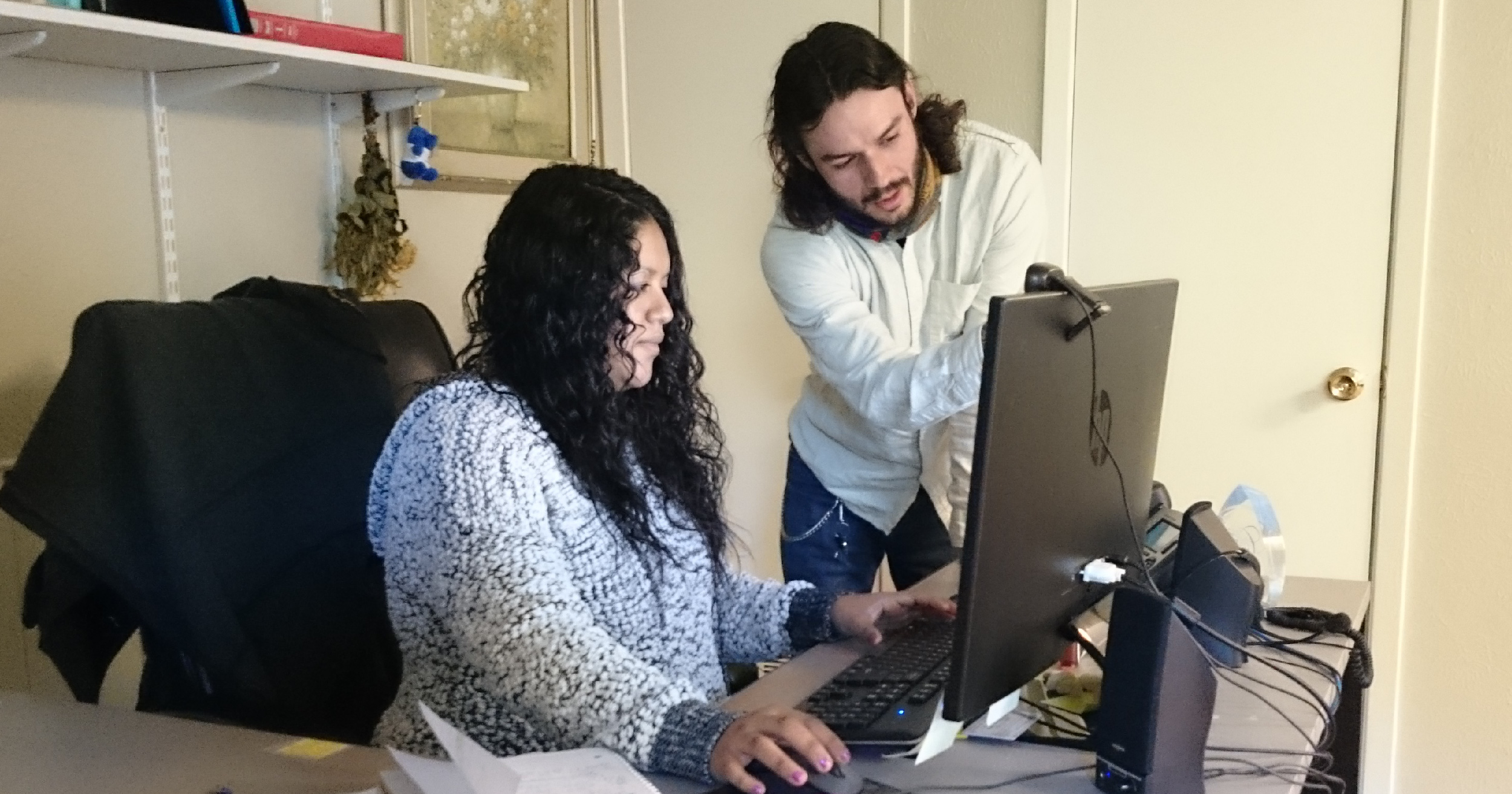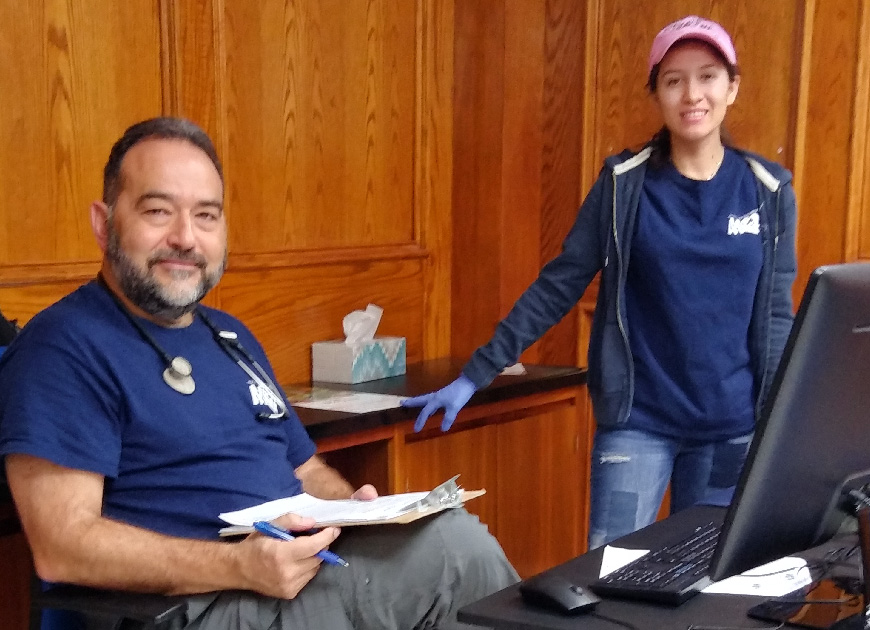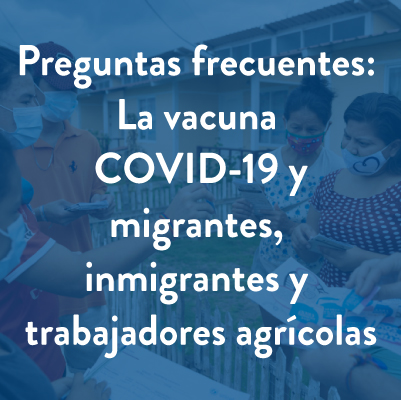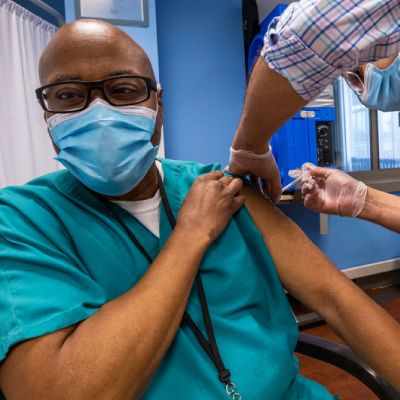- Who We Are
- Clinician Employment
- Publications
- Witness to Witness (W2W)
- El Premio Kugel & Zuroweste a la Justicia en la Salud
- Your Voice Matters: Photovoice Project
A Six-Year-Old Asylum Seeker with Microcephaly and Frequent Seizures Struggles to Get Emergency Care, So Health Network Steps In
Thu, 01/23/2020 | by Claire Hutkins Seda


Health Network's Alma Colmenero and Robert Corona discuss a case in the MCN office in Austin, TX.
[Editor’s Note: In the last two years, along the US-Mexico border, Migrant Clinicians Network has increased its programmatic efforts to expand Health Network, our bridge case management and patient navigation system for migrants, to serve newly arrived asylum seekers with ongoing health issues. This effort has resulted in the launch of several new initiatives, including Medical Review for Immigrants and the opening of a new MCN office at the border in McAllen, Texas. Many of the patients we are serving have urgent health needs. Here, we share the story of one recent patient -- a six-year-old boy -- who was seen at our McAllen office and received lifesaving care as he moved and resettled, under the guidance of Health Network Associate, Norma.]
A young Guatemalan mother and father and their two young sons crossed the border earlier this year seeking asylum.* The family crossed the Rio Grande without a US visa, then waited for immigration officials to approach them in order to ask for asylum. At some official points of entry, few -- sometimes just two -- applicants a day are accepted. This has led to hundreds or thousands of asylum seekers waiting on the Mexican side of the border, frequently without access to consistent food, shelter, restrooms, or other basic resources, and often in areas with high crime and kidnapping rates. This family may have chosen this route because of the urgency of health needs of the youngest son. Juan, six years old, suffered from numerous and overlapping health conditions: microcephaly, severe hypoxic-ischemic encephalopathy, epilepsy with recurrent seizures, and profound visual impairment. He also had a gastrostomy feeding tube.

MCN Chief Medical Officer Dr. Laszlo Madaras and Health Network associate Nahiely “Pinky” Garcia
After processing at a Border Patrol facility, the family was released to the Catholic Charities Respite Center in McAllen, Texas, with an order to appear in court a few months later in the East Coast state where they planned to stay with extended family. The young family would spend one day of recovery at the Respite Center and then continue on to their final destination. At the Respite Center, Juan was given a medical evaluation, during which his clinician found that he had pneumonia, and was also underweight and had dental caries. He was immediately hospitalized for four days for his pneumonia. After being discharged from the hospital, he was signed up with Migrant Clinicians Network’s Health Network, the bridge case management system that helps migrant patients connect to care in their next location. Juan’s doctors wanted to make sure he had follow-up appointments with a pediatrician and a neurologist within two weeks of being discharged. Norma, a Health Network Associate, was assigned to Juan’s case.
“Our first bump in the road was that we couldn’t get this patient’s medical records,” in order to prepare to forward them on to Juan’s next clinic, Norma recalled. It appeared that his records had disappeared from the hospital’s system. While Norma spent a lot of time and effort trying to track down the records, Juan and his family moved from Texas to an East Coast state. Norma was able to schedule an appointment with a pediatrician at a community health center in the family’s new town, and Juan’s new doctor referred Juan to go to school, attend physical therapy, and see a pediatric neurologist. But then Norma hit her next bump: she couldn’t find a neurologist who would accept him. The neurologist to which Juan had been referred did not pick up the office phone nor return the numerous voicemail messages that Norma left.
“This case was getting me frustrated at not being able to connect this patient with a neurologist -- and his seizures were getting worse,” Norma said. Juan’s pediatrician was also concerned, following up with Norma to see how the case was moving along. In addition to not being able to find a neurologist, Norma was struggling to get Juan into any care because Juan and his family were ineligible for health coverage due to their residency status. A specialized daycare rejected Juan for his lack of insurance. Other facilities told Norma that he needed to show proof that he lived locally for three months before approval for any type of insurance.
Meanwhile, Juan was not reacting well to his new medication, and was having more frequent and severe seizures -- up to six seizures a day. Juan’s pediatrician referred him to another neurologist at a local hospital, but the first available appointment was more than three months out. The pediatrician finally recommended an emergency room visit.
Juan was hospitalized for 12 days. “Our major concern was that the bill from the hospital was going to be very high,” without insurance, Norma noted. In the hospital, Juan was seen by 10 different specialists. He was given new medication. He was also finally seen by a neurologist, who was also scheduled to see him three months later.
A hospital social worker managed to enroll Juan’s family in health care coverage, but Juan’s parents rejected it. Although the co-pay was low with a $0 deductible, the plan would require the family to pay 25 percent of the hospital stay charges, which was exorbitant for a family with no work prospects or savings. (Pending the outcome of their asylum request, the parents are not legally permitted to work while they wait for their court date.)
The social worker continued to work on Juan’s case. Several weeks later, she was able to enroll the family in humanitarian Medicaid. Norma immediately enrolled Juan in specialized daycare and physical therapy using this new coverage.
“Juan’s mom is so happy that now they don’t have to worry about his health bills and that Juan is getting the best care for his needs,” Norma said. She described the family’s living situation: the mother is in her mid-twenties; the father is wearing an ankle monitor. They are living off of charity from a local church and the help of friends and family. Meanwhile, Juan is getting his urgent health needs met. Norma will continue to follow Juan until his next appointment with the neurologist, after which the case will be closed because the family is no longer migrating. “Juan still has lots of need, but we are getting there,” Norma said.
*Names and some locations have been altered.
Like what you see? Amplify our collective voice with a contribution.
Got some good news to share? Contact us on our social media pages above.
Return to the main blog page or sign up for blog updates here.







